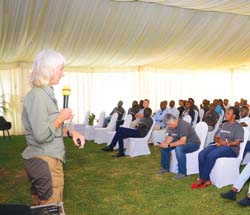By Mary Mwende Mbithi

Nathan A. Cobb, the father of American nematology, in a 1915 quote describes the tremendous ubiquity of nematodes on our planet and says “If all the matter in the universe except the nematodes were swept away, our world would still be dimly recognizable … we should find its mountains, hills, vales, rivers, lakes, and oceans represented by a film of nematodes. The location of towns would be decipherable, since for every massing of human beings, there would be a corresponding massing of certain nematodes. Trees would still stand in ghostly rows representing our streets and highways.”
Nematodes are found nearly everywhere, both on land and in the sea. The word ‘nematode’ is derived from the Greek, ‘nema’ meaning ‘thread’ and ‘odes’ meaning ‘resembling’.
A growers’ day organized by Bayer East Africa at Interplant Roses in Naivasha had a load of informative sessions for the farmers. This particular day International Centre of Insect Physiology and Ecology, (icipe) took the opportunity to educate the growers on nematodes. Dr. Danny Coyne and Dr. Solveig Haukeland of icipe eloquently and meticulously tackled the nematodes topic.
During the open day training, growers were taken through the importance of soil heath. By use of a microscope, they were shown different soil components and how to identify nematodes. In addition, they were explained the different types of nematodes and their importance or dangers to growers.
What are Nematodes?
“Nematodes are tiny microscopic worms comprising diverse trophic groups such as plant feeders, bacterial and fungal feeders as well as animal parasites. They are found worldwide in most habitats (such as soil, water, sea and in plants and animals), paused Dr Danny Coyne.
“At ICIPE we work with nematodes in soil. Most nematodes in soil are beneficial and play an important role in nutrient cycling, and others play a role in suppressing insect populations. A few species however are detrimental to plant health. Soil nematodes include; Bactivore, Fungivore, plant parasitic and predatory.” Continued Dr. Danny Coyne.
“Plant parasitic nematodes, microscopic soil dwelling worms, are among the most widespread and economically important crop pests globally. These pests infect plant roots causing direct yield loss by preventing adequate water and nutrient uptake by the plant. In addition, nematodes inflict indirect damage to plants due to secondary fungal or bacterial infections transmitted through wounds that arise after the pests feed on plant roots.” He continued.
Crisis brought about by Nematodes.
“Root-knot nematodes (RKNs), are seriuos plant parasitic nematodes that parasitize nearly every species of higher plants including flowers and high value vegetable crops. In Africa, crop production losses of up to 100% are encountered especially by small holder farmers.” Said Dr. Solveig.
“Root-knot nematodes obtain their name from their ability to infect and cause galls (swellings or knots) in their host plants. The nematodes feed and develop in the galls, in the process impeding nutrient and water uptake by the host plant resulting in poor growth and crop yield. Additionally, such damage increases the severity of opportunistic infections from other soil pathogens.” She continued.
“Several methods, including crop rotation, use of resistant cultivars, biological control and nematicides are used to control root-knot nematodes’’, Added Dr. Solveig Haukeland.
Nematode management
According to Dr. Solveig Haukeland, management of nematodes entails; Reducing infestation to non-injurious level, using different strategies (IPM), sustainably considering environmental & human health.
“Management options include; prevention, resistance, cultural management, chemical and biological control. Farmers are also to use clean planting material. Hot water treatment has also used in bananas (you dip banana suckers in boiling water for 30 seconds).” Said Dr. Soulveig Haukeland.
Avoid spreading nematodes
It is advisable to disinfect/wash agricultural tools, tractor/vehicle tyres, boots, planting, propagation material etc. In addition, you should watch out for nematodes in irrigation water.
Resistance, Tolerance, Susceptibility
Resistance: This is the ability to restrict/ prevent nematodes multiplication on plants
Tolerance: This is the ability of plants to grow well despite the multiplication of nematodes
Susceptible: Inability of plants to restrict growth and/or development of nematode
Resistance
This is very effective and environmentally safe, useful and (relatively) cheap and prevents nematode reproduction. However,it takes years to develop (in general). Resistance can be broken under certain conditions and selection of virulent nematode population.
Bio fumigation and Organic
Amendments: Farmers are advised to disinfect manure, insect frass (chitin), and neem cake and brassica waste.
Bionematicides: When the population is not very high, it is advisable to use bionematicides. The main bionematicides are neem products, plant extracts and garlic.
Nematicides: Farmers are advised to use chemicals which are effective and best when Initial nematode population is high. It is also advisable to use for valuable crops because they offer quick result is warranted
Parting Shot
Growers were advised to know the nematodes status of their farms. In addition IPM was recommended and where necessary nematicides. Dr. Danny Coyne and Dr. Solveig Haukeland asked growers to be free and discuss with them on soil health challenges or any symptoms they do not understand in their farms for assistance. Mr. Koome of Bayer East Africa thanked them for their presentations and challenged growers to use their knowledge.
